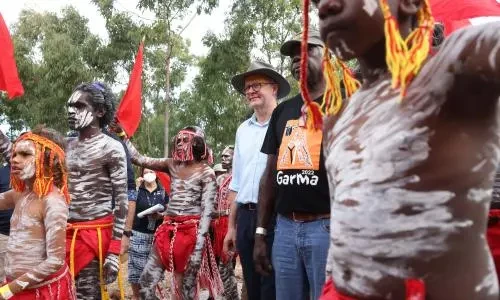Western Australia said Tuesday it is axing a five-week-old law to protect Indigenous sites, introduced after Rio Tinto blew up a 46,000-year-old sacred rock shelter in the state.
The decision to repeal the legislation was condemned by Indigenous groups, who complained of insufficient consultation and said their needs were being ignored.
The resource-rich state brought in the Aboriginal Heritage Act after the Anglo-Australian mining giant admitted in 2020 that it had destroyed the rock shelter to expand an iron ore mine in Juukan Gorge, Western Australia.
The site contained some of the oldest artefacts found in Australia and was considered sacred by the Indigenous Puutu Kunti Kurrama and Pinikura (PKKP) people of Western Australia.
Western Australia's premier, Roger Cook, said the new law -- which came into force on July 1 -- would be scrapped because it was too complex.
"The Juukan Gorge tragedy was a global embarrassment but our response was wrong," Cook said.
"We took it too far, unintentionally causing stress, confusion and division in our community."
Two months after being sworn in to the post following his predecessor's resignation, the centre-left Labor party premier said it was "obvious" changes were needed.
"The complicated regulations, the burden on landowners and the poor rollout of the new laws have been unworkable for all members of our community and for that, I am sorry," he said.
- 'Outraged' -
The state government said it would repeal the new law and revert to the previous legislation that had been in place for 50 years.
It would add some amendments, however, including an obligation on landowners to notify the government of any new information about an Aboriginal site.
Ordinary landowners would not be required to conduct their own heritage survey, the government said. Instead, the state will survey uncharted "high priority" areas over the next decade and with the consent of landowners.
Indigenous people were "outraged" by the decision to repeal the new heritage protection law, said the PKKP Aboriginal Council.
"The Cook government is reverting to laws that allowed (the) destruction of Juukan Gorge," said PKKP land and heritage manager Jordan Ralph.
He lamented a return to an approvals process that "benefits industry over our country".
Kado Muir, chairman of the National Native Title Council, which advocates for Indigenous rights, said the state government had not properly consulted First Nations people before deciding to repeal the legislation.
"We are left in a state of confusion and fear that cultural heritage sites are not going to be adequately and effectively protected in Western Australia," Muir told AFP.
"They seem to be offering concessions to farmers and others to be able to go out and destroy sites. The devil is in the detail -- we don't know what the detail looks like."
Muir said the state's actions showed the need for national legislation to act as a "backstop" to protect Australia's Indigenous cultural heritage.


